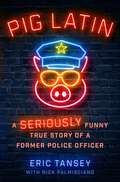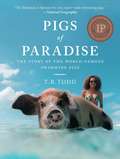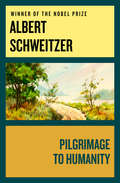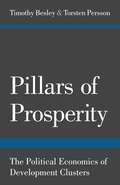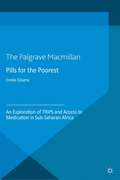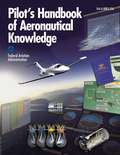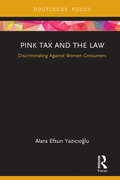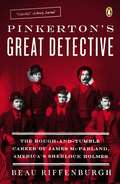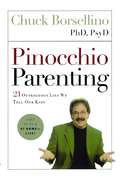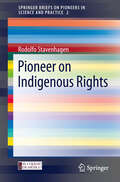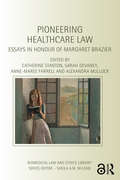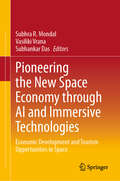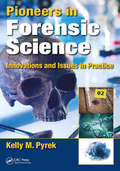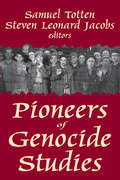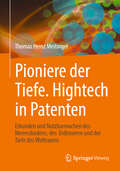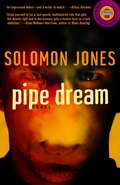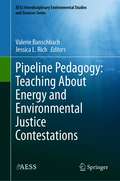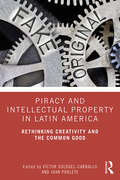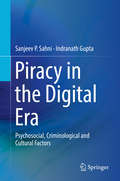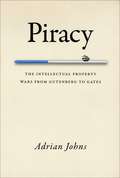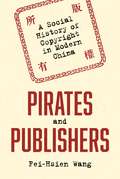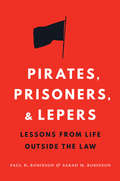- Table View
- List View
Pig Latin: A Seriously Funny True Story of a Former Police Officer
by Nick Palmisciano Eric TanseyFrom cop-turned-comic Eric Tansey, a hilarious and humanizing portrait of law enforcement for fans of Walk the Blue Line and You Can&’t Make This Stuff Up.Eric Tansey, a former Army scout and Special Operations military veteran, joined the police force with a ton of unrealistic expectations. The reality of the job knocked him down and changed his perspective on everything. Always a magnet for uncanny, wild situations, Tansey reveals exactly what it&’s like to deal with everyday life as a police officer—from trying to tackle naked suspects to pepper spraying yourself in the face, from dealing with an angry mob to coaxing suicidal subjects off a bridge, an uncut version of everything is included. Going behind the badge to bring the public a real understanding of the job, Pig Latin hopes to help inspire sympathy rather than condemnation and to encourage current law enforcement with the knowledge that they are not alone in their mistakes, their fear, and their experience on the job.
Pigs of Paradise: The Story of the World-Famous Swimming Pigs
by T. R. Todd“The Bahamas are famous for sun, sand—and swimming pigs.” —National GeographicIn the middle of paradise, with billionaires and celebrities for neighbors, is an island populated only by swimming pigs. For decades, this archipelago of 365 islands would remain largely unknown to the world. It would not be a ruthless pirate, pioneering loyalists, a notorious drug kingpin, or the infamous Fyre Festival that would unveil Exuma to the world, but rather the most unlikely of creatures. Appearing in magazines, videos, newspapers, commercials, TV shows, and countless selfies, the Swimming Pigs of Exuma, in the Bahamas, have become a bucket-list sensation and have been named one of the marvels of the universe. But how did they reach this celebrity status? What made them so famous? And why, in February 2017, did so many of them die? Pigs of Paradise is an unlikely story of humble beginnings and a swift rise to stardom. With interviews from historians, world-renowned ecologists, famous pig owners, and boat captains, it thoughtfully considers what this phenomenon says about not only these animals but also about us.
Pilgrimage to Humanity
by Albert SchweitzerThe dimensions of the central theme are illuminated by Schweitzer&’s discussions of his philosophy of culture, the course of his life, his ministry to human needs in Africa, the idea of reverence for life, the ideal of world peace, the significance of liberal Christianity, and the lives, world-views, and contributions of Johann Goethe, J. S. Bach, and Jesus of Nazareth. The pages of these selections give a remarkable revelation of the creative spirit of a modern saint and philosopher. The translation is by Water E. Stuermann, University of Tulsa.
Pilgrimage to Humanity: The Essence Of Faith, Pilgrimage To Humanity, The Quest Of The Historical Jesus, And The Light Within Us (Paperback Ser.)
by Albert SchweitzerThe dimensions of the central theme are illuminated by Schweitzer&’s discussions of his philosophy of culture, the course of his life, his ministry to human needs in Africa, the idea of reverence for life, the ideal of world peace, the significance of liberal Christianity, and the lives, world-views, and contributions of Johann Goethe, J. S. Bach, and Jesus of Nazareth. The pages of these selections give a remarkable revelation of the creative spirit of a modern saint and philosopher. The translation is by Water E. Stuermann, University of Tulsa.
Pillars of Justice: Lawyers and the Liberal Tradition
by Owen FissThe constitutional theorist Owen Fiss explores the purpose and possibilities of life in the law through a moving account of thirteen lawyers who shaped the legal world during the past half century. He tries to identify the unique qualities of mind and character that made these individuals so important to the institutions and principles they served.
Pillars of Prosperity: The Political Economics of Development Clusters (The Yrjö Jahnsson Lectures)
by Torsten Persson Timothy BesleyHow nations can promote peace, prosperity, and stability through cohesive political institutions"Little else is required to carry a state to the highest degree of opulence from the lowest barbarism, but peace, easy taxes, and a tolerable administration of justice; all the rest being brought about by the natural course of things." So wrote Adam Smith a quarter of a millennium ago. Using the tools of modern political economics and combining economic theory with a bird's-eye view of the data, this book reinterprets Smith's pillars of prosperity to explain the existence of development clusters—places that tend to combine effective state institutions, the absence of political violence, and high per-capita incomes.To achieve peace, the authors stress the avoidance of repressive government and civil conflict. Easy taxes, they argue, refers not to low taxes, but a tax system with widespread compliance that collects taxes at a reasonable cost from a broad base, like income. And a tolerable administration of justice is about legal infrastructure that can support the enforcement of contracts and property rights in line with the rule of law. The authors show that countries tend to enjoy all three pillars of prosperity when they have evolved cohesive political institutions that promote common interests, guaranteeing the provision of public goods. In line with much historical research, international conflict has also been an important force behind effective states by fostering common interests. The absence of common interests and/or cohesive political institutions can explain the existence of very different development clusters in fragile states that are plagued by poverty, violence, and weak state capacity.
Pills for the Poorest: An Exploration of TRIPS and Access to Medication in Sub-Saharan Africa (Palgrave Socio-Legal Studies)
by E. CloatreThe desperate need for a vast part of the global population to access better medicines in more certain ways is one of the biggest concerns of the modern era. Pills for the Poorest offers a new perspective on the much-debated issue of the links between intellectual property and access to medication. Using ethnographic case studies in Djibouti and Ghana, and insights from actor-network theory, it explores the ways in which TRIPs and pharmaceutical patents are translated in the daily practices of those who purchase, distribute, and use (or fail to use) medicines in sub-Saharan Africa. It suggests that focusing on routine practices and the material deployment of intellectual property significantly enriches our understanding of the complex dynamics that animate the field of access to medicines and helps relocate the role of law within those processes. It demonstrates how intellectual property affects access to medicines in ways that are often discreet, indirect and forgotten. By exploring these complex mechanisms, it seeks to ask questions about the modes of actions of pharmaceutical patents, but also, more generally, about the complexity of legal objects.
Pilot's Handbook of Aeronautical Knowledge: Faa-h-8083-25, December 2003 (FAA Handbooks Ser.)
by Federal Aviation AdministrationPilot's Handbook of Aeronautical Knowledge, created by the Federal Aviation Administration, is the official reference manual for pilots at all levels. An indispensable and invaluable encyclopedia, it deals with all aspects of aeronautical information.Each chapter focuses on a different area that pilots are tested on in flight school and must need to know before they fly a plane on of their own. These topics include:aircraft structureprinciples of aerodynamicsflight controlsaircraft systemsflight instrumentsand moreFlight manuals and documentation are also covered, as is specialized information on such matters as weight and balance, aircraft performance, weather, navigation, airport operations, aeromedical factors, and decision-making while flying. An updated appendix, detailed index, and full glossary make this book easy to navigate and useful in quick reference situations.
Pink Tax and the Law: Discriminating Against Women Consumers
by Alara Efsun YazıcıoğluThe emergence of the terms ‘pink tax’ and ‘tampon tax’ in everyday language suggests that women, who already suffer from an economic disadvantage due to the gender wage gap, are put in an even more detrimental position by means of ‘discriminatory consumption taxes’. This book is the first conducting a legal analysis to establish to what extent this public perception is accurate. <P><P>Does the practice of ‘pink tax’ effectively amount to a tax in the legal sense? Does the so-called ‘tampon tax’ genuinely constitute an anomaly within the general consumption tax system? Most importantly, can these two ‘taxes’ be legally qualified as discriminatory? <P><P>This book provides scientific answers to these questions. It first cuts through the existent information clutter by elucidating the pertinent economic, sociological and psychological components of the practices referred to as ‘pink tax’ and ‘tampon tax’. It then proceeds with a thorough legal analysis of all relevant aspects to determine whether women are indeed subject to discriminatory consumption taxes. <P><P>It is well-established that women earn less than men. This book investigates if they simultaneously pay more due to ‘discriminatory consumption taxes’.
Pinkerton's Great Detective: The Rough-and-Tumble Career of James McParland, America's Sherlock Holmes
by Beau RiffenburghThe story of the legendary Pinkerton detective who took down the Molly Maguires and the Wild BunchThe operatives of the Pinkerton's National Detective Agency were renowned for their skills of subterfuge, infiltration, and investigation, none more so than James McParland.<P><P> So thrilling were McParland's cases that Sir Arthur Conan Doyle included the cunning detective in a story along with Sherlock Holmes.Riffenburgh digs deep into the recently released Pinkerton archives to present the first biography of McParland and the agency's cloak-and-dagger methods. Both action packed and meticulously researched, Pinkerton's Great Detective brings readers along on McParland's most challenging cases: from young McParland's infiltration of the murderous Molly Maguires gang in the case that launched his career to his hunt for the notorious Butch Cassidy and the Wild Bunch to his controversial investigation of the Western Federation of Mines in the assassination of Idaho's former governor.Filled with outlaws and criminals, detectives and lawmen, Pinkerton's Great Detective shines a light upon the celebrated secretive agency and its premier sleuth.
Pinocchio Parenting: 21 Outrageous Lies We Tell Our Kids
by Chuck BorsellinoAre you a Pinocchio Parent? You may be asking yourself these very questions: What lies, clichés, and half-truths do I tell my children? How do these lies hurt my children and my relationship with them? Clinical psychologist and author Chuck Borsellino claims that our culture condones all sorts of lies -- from "tiny fibs" to calloused misrepresentations. Though well-intentioned in our unintentional lies, we set our children up for failure and disappointment and undercut our credibility. In the pages of this book, Dr. Chuck Borsellino helps you sort out fact from fiction, intention from outcome. Most important, you'll learn a better way -- a way to help your children live life within the bounds of reality while fully exploring the dreams of their heart.
Pioneer on Indigenous Rights
by Rodolfo StavenhagenOn the occasion of the 80th birthday of Rodolfo Stavenhagen, a distinguished Mexican sociologist and professor emeritus of El Colegio de Mexico, Úrsula Oswald Spring (UNAM/CRIM, Mexico) introduces him as a Pioneer on Indigenous Rights due to his research on human rights issues, especially when he served as United Nations Special Rapporteur on the rights of indigenous peoples. First, in a retrospective Stavenhagen reviews his scientific and political work for the rights of indigenous peoples. Seven of his classic texts address Seven Fallacies about Latin America (1965); Decolonializing Applied Social Sciences (1971); Ethnodevelopment: A Neglected Dimension in Development Thinking (1986); Human Rights and Wrongs: A Place for Anthropologists? (1998); Indigenous Peoples and the State in Latin America: An Ongoing Debate (2000); Building Intercultural Citizenship through Education: A Human Rights Approach (2006); and Making the Declaration Work (2006). This volume discusses the emergence of indigenous peoples as new social and political actors at the national level in numerous countries, as well as on the international scene. This book introduces a trilogy of Briefs on Rodolfo Stavenhagen published in the same series Pioneers in Science and Practice.
Pioneering Healthcare Law: Essays in Honour of Margaret Brazier (Biomedical Law and Ethics Library)
by Anne-Maree Farrell Alexandra Mullock Catherine Stanton Sarah DevaneyThis book celebrates Professor Margaret Brazier’s outstanding contribution to the field of healthcare law and bioethics. It examines key aspects developed in Professor Brazier’s agenda-setting body of work, with contributions being provided by leading experts in the field from the UK, Australia, the US and continental Europe. They examine a range of current and future challenges for healthcare law and bioethics, representing state-of-the-art scholarship in the field. The book is organised into five parts. Part I discusses key principles and themes in healthcare law and bioethics. Part II examines the dynamics of the patient–doctor relationship, in particular the role of patients. Part III explores legal and ethical issues relating to the human body. Part IV discusses the regulation of reproduction, and Part V examines the relationship between the criminal law and the healthcare process. Offering a collaborative review of key and innovative themes in the field, the book will be of great interest and use to academics and students working in healthcare law and bioethics, and those working in health policy, law and regulation at both national and international levels. Chapter 10 of this book is freely available as a downloadable Open Access PDF at www.tandfebooks.com/openaccess. It has been made available under a Creative Commons Attribution-Non Commercial-No Derivatives 3.0 license.
Pioneering the New Space Economy through AI and Immersive Technologies: Economic Development and Tourism Opportunities in Space
by Subhankar Das Subhra R. Mondal Vasiliki VranaThis book provides a comprehensive, forward-looking examination of how artificial intelligence, immersive technologies, and anthropomorphized robots shape the future of space exploration and commercialization. Space tourism is on the brink of a revolutionary transformation driven by technological advancements and a growing private sector involvement. Bringing together experts from diverse fields, including aerospace engineering, computer science, economics, law, and psychology, the book offers a comprehensive, multidisciplinary perspective on the challenges and opportunities in this exciting new frontier. An essential resource for academics, industry professionals, policymakers, and enthusiasts interested in the intersection of space exploration, tourism, and advanced technologies, the book aims to inspire and inform the next generation of space entrepreneurs, researchers, and explorers by providing a comprehensive overview of current developments and future possibilities in space economy.
Pioneers in Forensic Science: Innovations and Issues in Practice
by Kelly M. PyrekThis book highlights the contributions of leading forensic science practitioners, iconic figures who have been integral in both establishing current scientific and medicolegal practices and innovative evidence collection, testing, and analysis methods. Such professionals include Henry Lee, Michael Baden, William Bass, Jay Siegel, John Butler, Cyril Wecht, Vincent Di Maio, Marcella Fierro, Barry Fisher, and more. Previously unpublished interviews with these pioneers in the field, expressly undertaken for the purposes this book, examine the last 30 years—past trends that have shaped the field—as well as current and emerging trends that have, and will shape, the future of forensic science.
Pioneers of Genocide Studies
by Samuel Totten Steven Leonard JacobsFrom the early efforts that emerged in the struggle against Nazism, and over the past half century, the field of genocide studies has grown in reach to include five genocide centers across the globe and well over one hundred Holocaust centers. This work enables a new generation of scholars, researchers, and policymakers to assess the major foci of the field, develop ways and means to intervene and prevent future genocides, and review the successes and failures of the past.The contributors to Pioneers of Genocide Studies approach the questions of greatest relevance in a personal way, crafting a statement that reveals one's individual voice, persuasions, literary style, scholarly perspectives, and relevant details of one's life. The book epitomizes scholarly autobiographical writing at its best. The book also includes the most important works by each author on the issue of genocide.Among the contributors are experts in the Armenian, Bosnian, and Cambodian genocides, as well as the Holocaust against the Jewish people. The contributors are Rouben Adalian, M. Cherif Bassiouni, Israel W. Charney, Vahakn Dadrian, Helen Fein, Barbara Harff, David Hawk, Herbert Hirsch, Irving Louis Horowitz, Richard Hovannisian, Henry Huttenbach, Leo Kuper, Raphael Lemkin, James E. Mace, Eric Markusen, Robert Melson, R.J. Rummel, Roger W. Smith, Gregory H. Stanton, Ervin Staub, Colin Tatz, Yves Ternan, and the co-editors. The work represents a high watermark in the reflections and self-reflections on the comparative study of genocide.
Pioniere der Tiefe. Hightech in Patenten: Erkunden und Nutzbarmachen des Meeresbodens, des Erdinneren und der Tiefe des Weltraums
by Thomas Heinz MeitingerDas Buch beschreibt die historischen und die aktuellen Möglichkeiten Rohstoffe und Bodenschätze zu erkunden und zu fördern. Es wird die technologische Entwicklung präsentiert von den ersten technischen Möglichkeiten bis zum heutigen hochmodernen Tiefseebergbau.
Pipe Dream: A Novel
by Solomon JonesThe lawyer turned on the tape recorder, handed his client a cigarette, and lit it for him. Black drew hard, squinting as the smoke rushed into his lungs. "Where do you want to start?"the lawyer said, lighting a cigarette of his own. "I guess there’s only one place to start; at Broad and Erie. " Johnny Podres, a politician whose record against corruption had been propelling him straight to the mayor’s office, is found murdered in a North Philly crack house. Enter Samuel Jackson, a. k. a. Black, a drug addict who knows better, a man embittered by the fact that he can’t seem to escape from his addiction to crack cocaine or, for that matter, from himself. Though he was once a family man with a wife and son, Black’s only concern these days is getting his next high, that is, until he stumbles across a friend and fellow addict, Leroy, and both become prime suspects in the Podres murder. Black and Leroy hook up with two female pipers: Clarisse, a registered nurse who is slowly losing to crack any semblance of a respectable life, and Pookie, who already has lost it. Soon the hunt is on for all four as they try to stay one step ahead of a police department under tremendous pressure to solve the case—because if a killer isn’t found soon, this could blow up into one of the biggest scandals in Philadelphia history. Solomon Jones weaves a suspenseful story against the backdrop of corruption in the Philadelphia police department and centers it on a group of drug addicts who, in the process of fleeing the law, come to terms with their own addiction, leading to some devastating consequences.
Pipeline Pedagogy: Teaching About Energy and Environmental Justice Contestations (AESS Interdisciplinary Environmental Studies and Sciences Series)
by Valerie Banschbach Jessica L. RichThe proliferation of pipelines to transport oil and natural gas represents a major area of contestation in the landscape of energy development. Battles over energy pipelines pit private landowners, local community representatives, and environmentalists against energy corporations and industry supporters, sometimes drawing opposition and attention from well beyond the impacted regions, as in the case of the Standing Rock/Dakota Access Pipeline. Stakeholders must navigate complex government regulatory processes, interpret technical and scientific reports, and endure lengthy and expensive court battles. As with other forms of environmental injustice, the contentious construction of pipelines often disproportionately impacts communities of lower economic development, people of color, and indigenous peoples; pipelines also pose potential short and long-term health and safety threats. With the expansion of energy pipelines carrying fracked oil and gas across the United States and abroad, the moment is ripe for teaching about pipeline projects and engaging students and community members in learning about methods for mobilization. Our volume examines pedagogical opportunities, challenges, and interventions that campus-community engagement, and other kinds of community engagement, produce in relation to infrastructuring in the form of pipeline development.
Piracy and Intellectual Property in Latin America: Rethinking Creativity and the Common Good
by Juan Poblete Victor Goldgel-Carballo PashtanPiracy and Intellectual Property in Latin America is the first sustained effort to present an alternative framework for understanding piracy and contemporary challenges to global discourses on intellectual property (IP) in the Americas. While piracy might just look like theft and derivative reproduction from the perspective of many right-holders, the contributors to this volume go beyond this economic-driven logic and show how practices of copying are in fact practices of reinvention that reflect the rich social networks and forms of creativity, authorship, commerce, and consumption that characterize informal economies. From a perspective informed by contemporary scenarios in Mexico, Brazil, Chile, Argentina, Peru, Guatemala, and the United States, they engage in a discussion of alternatives that—predicated on the importance of protecting culture—allow for other ways of conceiving prosperity at local, national, regional, and global levels. Examples discussed include video games, clothing, trinkets, music, film, TV, and books. Designed to help understand the broader implications of IP and piracy for the field of Latin American studies, this book will be a major contribution to Global South studies, as well as to the growing bibliography on globalization, informal markets, and piracy.
Piracy and the State: The Politics of Intellectual Property Rights in China
by Martin K. DimitrovChina has the highest levels of copyright piracy and trademark counterfeiting in the world, even though it also provides the highest per capita volume of enforcement. In this original study of intellectual property rights (IPR) in relation to state capacity, Dimitrov analyzes this puzzle by offering the first systematic analysis of all IPR enforcement avenues in China, across all IPR subtypes. He shows that the extremely high volume of enforcement provided for copyrights and trademarks is unfortunately of a low quality, and as such serves only to perpetuate IPR violations. In the area of patents, however, he finds a low volume of high-quality enforcement. In light of these findings, the book develops a theory of state capacity that conceptualizes the Chinese state as simultaneously weak and strong. It also demonstrates that fully rationalized enforcement of domestic and foreign IPR is emerging unevenly and, somewhat counter-intuitively, chiefly in those IPR subtypes that are least subject to domestic or foreign pressure. The book draws on extensive fieldwork in China and five other countries, as well as on 10 unique IPR enforcement datasets that exploit previously unexplored sources, including case files of private investigation firms.
Piracy in the Digital Era: Psychosocial, Criminological and Cultural Factors
by Indranath Gupta Sanjeev P. SahniThis book builds an empirical basis towards creating broader prevention and intervention programs in curbing digital piracy. It addresses the psychosocial, cultural and criminological factors associated with digital piracy to construct more efficient problem-solving mechanisms. Digital piracy including online piracy involves illegal copying of copyrighted materials. This practice costs the software industry, entertainment industry, and governments billions of dollars every year. Reports of the World Intellectual Property Organization (WIPO) and Business Software Alliance (BSA) view piracy largely in the light of economic factors; the assumption being that only those who cannot afford legitimate copies of software, music, and movies indulge in it. Drawing on research and theories from various disciplines like psychology, sociology, criminology, and law, the authors have designed an empirical study to understand the contribution of psychological, cultural and criminological factors to digital piracy. The chapters include data from India and China, which continue to be on the Special 301 report priority watch list of the WIPO, and Serbia, which has been on the watch list 4 times. They examine the role of self-control, self-efficacy, perceived punishment severity, awareness about digital piracy, peer influence, neutralization techniques, novelty seeking, pro-industry factors and other socio-demographic factors in predicting digital piracy. This book addresses a large readership, comprising academics and researchers in psychology, criminology and criminal justice, law and intellectual property rights, social sciences, and IT, as well as policymakers, to better understand and deal with the phenomenon of digital piracy.
Piracy: The Intellectual Property Wars from Gutenberg to Gates
by Adrian JohnsBrimming with broader implications for today's debates over open access, fair use, and free culture, Johns argues that piracy has been an engine of social, technological, and intellectual innovations as often as it has been their adversary.
Pirates and Publishers: A Social History of Copyright in Modern China (Studies of the Weatherhead East Asian Institute #6)
by Fei-Hsien WangA detailed historical look at how copyright was negotiated and protected by authors, publishers, and the state in late imperial and modern ChinaIn Pirates and Publishers, Fei-Hsien Wang reveals the unknown social and cultural history of copyright in China from the 1890s through the 1950s, a time of profound sociopolitical changes. Wang draws on a vast range of previously underutilized archival sources to show how copyright was received, appropriated, and practiced in China, within and beyond the legal institutions of the state. Contrary to common belief, copyright was not a problematic doctrine simply imposed on China by foreign powers with little regard for Chinese cultural and social traditions. Shifting the focus from the state legislation of copyright to the daily, on-the-ground negotiations among Chinese authors, publishers, and state agents, Wang presents a more dynamic, nuanced picture of the encounter between Chinese and foreign ideas and customs.Developing multiple ways for articulating their understanding of copyright, Chinese authors, booksellers, and publishers played a crucial role in its growth and eventual institutionalization in China. These individuals enforced what they viewed as copyright to justify their profit, protect their books, and crack down on piracy in a changing knowledge economy. As China transitioned from a late imperial system to a modern state, booksellers and publishers created and maintained their own economic rules and regulations when faced with the absence of an effective legal framework.Exploring how copyright was transplanted, adopted, and practiced, Pirates and Publishers demonstrates the pivotal roles of those who produce and circulate knowledge.
Pirates, Prisoners, and Lepers: Lessons from Life Outside the Law
by Sarah M. Robinson Paul H RobinsonIt has long been held that humans need government to impose social order on a chaotic, dangerous world. How, then, did early humans survive on the Serengeti Plain, surrounded by faster, stronger, and bigger predators in a harsh and forbidding environment? Pirates, Prisoners, and Lepers examines an array of natural experiments and accidents of human history to explore the fundamental nature of how human beings act when beyond the scope of the law. Pirates of the 1700s, the leper colony on Molokai Island, prisoners of the Nazis, hippie communes of the 1970s, shipwreck and plane crash survivors, and many more diverse groups—they all existed in the absence of formal rules, punishments, and hierarchies. Paul and Sarah Robinson draw on these real-life stories to suggest that humans are predisposed to be cooperative, within limits. What these “communities” did and how they managed have dramatic implications for shaping our modern institutions. Should today’s criminal justice system build on people’s shared intuitions about justice? Or are we better off acknowledging this aspect of human nature but using law to temper it? Knowing the true nature of our human character and our innate ideas about justice offers a roadmap to a better society.
